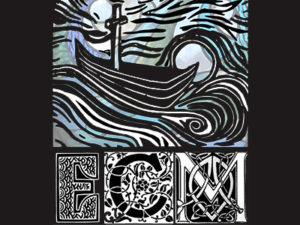Spirited Reflection: Celebrating Ecumenism

I want to take a moment to say thank you to KAIROS, for all the work you do. It is of such importance, and such good work. I’m always a little hesitant to use the word righteous when it comes to church stuff, but there is something about your work that feels right. One of the reasons I’m so thankful, and why KAIROS is so remarkable I think, is not only the rightness of your work, the ecumenical nature of your approach as well.
At the University of Guelph I work with the Ecumenical Campus Ministry (ECM), where we have all sorts of interesting conversations about the joys and challenges of ecumenism. In our ministry, we have three ecumenical partners (Anglican, Presbyterian, United), and so I find it impressive and mind-boggling that KAIROS maintains a partnership among 10 denominational partners. That’s amazing.
Every once in a while, a conversation comes up in our ministry, about whether we should retain the word Ecumenical in our title, since young adults on campus had no idea what it means. Ecumenical is, admittedly, a very churchy word. But I figure university students are learning new words every day, and ecumenism is such a hopeful concept for people to know about – so I’ve often argued for keeping the word in our ministry.
Ecumenical, to me, is about different traditions collaborating together for the sake of others. And so there is always an outward propulsion when we engage in ecumenism, to engage and care for others. It’s a great forum within which to talk about the Body of Christ, and the difference between major points of difference and minor ones. Ecumenism is a wonderful nexus point among networks and groups of people, and the conversations we have at ECM are richer because of the different starting points and experiences we bring to it.
The Issues
But there are some things, where having the strength of an ecumenical community behind you, are important. Justice issues, issues of marginalization and persecution, areas where lives are in the balance, these things require a strong unified Christian response. In the face of these issues, our theological nuances or differences of practice begin to look like wallpaper, luxuries to consider and play with, not the real things that matter.
And so, when our campus seeks out a faith community on campus that is affirming and supportive of the LGBTQ community, I’m glad that our ecumenical ministry can take up that space on behalf of our networks. When a student comes out for the first time, they need to know there is more than just a sympathetic chaplain; there are whole communities and traditions that stand with them in their vulnerability.
And when Canadian mining companies need to be challenged because of their ill-treatment of indigenous people around the world, I’m glad we can call on KAIROS to challenge them on behalf of our networks and faith traditions.
But I know too, that ecumenical partnerships can be tricky. Campus ministry, and I imagine justice work, can feel like a roller coaster – there are high high’s, where we celebrate victories and receive encouragement, but there are also low low’s, where we feel discouraged and alone. It can be isolating, knowing that you supposedly have the backing of wide swaths of the Christian church, but when you look around all you see is some small NGO in a stuffy little office somewhere, or some single chaplain tucked in a cubicle on campus. The links we nurture between our communities and the ecumenical endeavours that represent us are so important, for our witness, and for the well being of organizations like KAIROS and campus ministries. So I encourage you— take the time to get involved, invest in, build a bridge to help sustain the ecumenical ministries that represent you. It really does make all the difference.
Doing group work
Lastly, a bit of a story from my past. As a university student, I hated group work. I was an English major who used most of my electives to take Religious Studies courses – both of which lean towards the solitary, essay-writing disciplines. The rare times when I’d have to do a group project were like torture to me. Maybe you feel likewise about it. The imbalance of workloads, between keeners and the coasters, the passionate and the passengers, can be hard to endure. The only thing worse is when nobody engages at all, and the project doesn’t get done. The vision, the hope, the expectation should be a collaborative group where every voice is heard, every partner engaged, pulling their fair share of the load. But we all know this is rarely the case. Ecumenism is group work, and the vision of God is of a group where all are actively engaged, not around our particularities or differences, but around the lifting up of the poor and marginalized. So I encourage you to get on board.
Once again, thanks to KAIROS for all the work you do, and the ways you gather us together, to be the Body of Christ serving others. Thanks to those who support KAIROS and ecumenical endeavours like it.
Andrew Hyde is a Designated Lay Minister in the United Church of Canada, and serves as the Ecumenical Campus Minister at the University of Guelph. He lives in Guelph, Ontario with his wife Andrea, and their two children.




